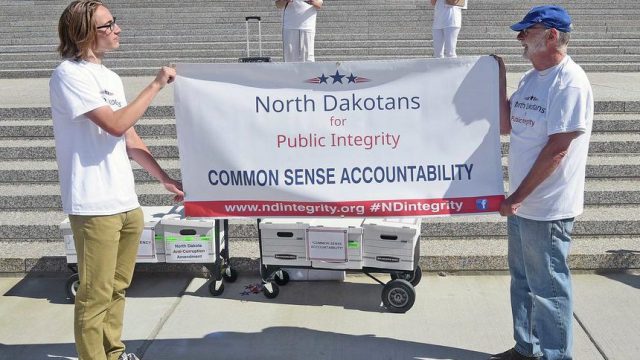Free Speech Groups, Including the ACLU, Oppose Legislative Efforts to Implement Measure 1

TOM STROMME/Tribune Alex Hilzendeger, left, and Norton Lovold hold a banner in front of boxes of petitions outside the state capitol in Bismarck on Monday morning as speakers Dina Butcher, left, and Ellen Chaffee address a crowd of 32 people. The petitions if approved would place a measure on the November ballot to amend the state constitution. For a video of Butcher go to www.bismarcktribune.com.
Ever since voters approved Measure 1 on the ballot last year there’s been a steady drumbeat of criticism aimed at state lawmakers who are now tasked with implementing it.
Many of the lawmakers are reluctant, seeing in Measure 1 some pretty dire implications for speech and other political freedoms. Measure 1’s supporters (and even some, like the Fargo Forum editorial board, which opposed Measure 1 during the election) are trying to shout down that reluctance by invoking the “will of the people.”
As if the electorate were infallible. In America’s past there has been popular support for a lot of odious policies. A win at the ballot box does not suddenly turn bad policy into good policy.
To that point, free speech groups which opposed Measure 1 during the election continue to oppose its implementation by the Legislature. The ACLU just sent out a press release expressing their continued concerns about the policy ahead of committee hearings on legislation to implement the measure:
This bill isn’t just about election-related speech. It could also apply to speech intended to “influence” state government actions. Citizens calling their legislators to advocate for changes in a particular law or advocacy groups campaigning in support of legislative and regulatory issues that matter most to them might find themselves caught up in trying to figure out these confusing new requirements, or, worse, may find themselves in violation of the law and subject to penalty.
“Requiring large or small advocacy groups and non-profit organizations to disclose their donors when they speak about controversial issues like gun rights, religious liberty or abortion would result in less speech about those issues,” said Heather Smith, executive director of the ACLU of North Dakota. “That is a clear harm to public discourse and a result directly opposed to the values embodied by the First Amendment. To protect the First Amendment speech and association rights of North Dakotans, the state should include precise definitions limiting the application of this law to ‘express advocacy’ of the election or defeat of a candidate for office or the adoption or rejection of a statewide referendum or ballot initiative.”
Here’s their full release. I should note that the ACLU does support the portion of Measure 1 which creates an ethics commission.
The Institute for Free Speech also sent out a press release today opposing the implementation legislation (full release):
The House Ethics committee is currently considering legislation (H.B. 1521) to implement Measure 1 as approved by voters. However, Measure 1 contains severe constitutional flaws. The measure imposes vague rules on individuals and groups that wish to speak about public matters and state government. Many of these rules are likely unconstitutional.
“H.B. 1521 does not and cannot fully resolve Measure 1’s constitutional problems. While the Legislative Assembly has an obligation to implement the measure, it cannot ignore our First Amendment rights to speak and publish. Ultimately, the courts as well as the legislature will likely play a role in determining how Measure 1 is adapted into law,” said Institute for Free Speech Legal Director Allen Dickerson.
The ACLU is generally seen as a left-leaning organization. The Institute for Free Speech’s founder, meanwhile, is a Republican. His group is perceived as generally being right-leaning.
Measure 1’s supporters have tried to cast criticism as some sort partisan or ideological aversion to the policy, but perhaps when left wing and right wing free speech groups come together to condemn the policy we can agree the problem is larger than politics.




